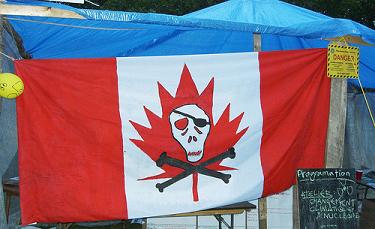It’s membership time. Cultivate Canada’s media. Support rabble.ca. Become a member.
Nicole Eaton may be Canada’s Mitt Romney.
The Republican presidential candidate comes across as a wealthy patrician with little sense of how tough the world can be for people who don’t have tens of millions of dollars at their disposal.
That tendency also seems to afflict Eaton, a wealthy Conservative fundraiser appointed to the Senate by Stephen Harper. She’s a leading figure in the Harper government’s campaign to aggressively go after environmental activist groups by threatening their charitable status.
“I don’t understand their fear of a chill,” Eaton told the Globe and Mail last week. Eaton, who was born wealthy and married into the Canadian department store fortune, has probably never experienced the kind of fear that the Harper government seems bent on instilling in environmental activists who dare to challenge its agenda.
In fact, creating a chill among environmental activists seems to be precisely the aim of the Harper team, as it gears up for a new stage in its battle to sideline anyone raising questions about the relentless growth of Alberta’s oilsands.
And the involvement of Eaton somehow highlights the David and Goliath nature of the climate change fight, as the Harper government lines up with wealthy interests in a battle that particularly imperils some of world’s poorest people who live in low-lying regions soon to be engulfed by rising seas.
It seems unnecessary to point out that the proper role of government is to protect the public interest, which includes not only encouraging economic development but also protecting us against the devastating consequences of climate change.
But, with his close ties to the oil industry, Harper has long sought to derail global climate action.
Now, with a majority government, Harper’s campaign to scuttle action on climate change has taken a more insidious turn, as he uses the resources of the state to intimidate and silence critics.
To this end, the government recently revised anti-terrorism legislation to add environmental groups as a potential threat. It’s also provided additional resources to government tax authorities to audit environmental charities. And it’s denounced environmentalists as “extremists” funded by “foreign money” — that is, money they receive from U.S. charitable foundations aiding their efforts to protect endangered ecosystems in Canada and elsewhere.
Eaton, in launching a Senate inquiry into the role of foreign money in environmental charities, charged that there was “influence peddling” attempting to shape Canadian policy.
Her probe, however, won’t include an examination of the role in shaping Canadian policy played by the most successful influence peddlers in history — the multi-trillion-dollar international oil lobby.
Instead, Eaton will have environmentalists in her crosshairs — those would-be terrorists, led by 76-year-old national icon David Suzuki, who, in a nationwide CBC poll, was selected as one of the greatest Canadians of all time.
Suzuki recently left the board of the David Suzuki Foundation, saying he feared his outspoken comments might bring additional heat onto the organization.
Nor will the right-wing Fraser Institute have to worry about an audit of its charitable status, despite receiving $500,000 between 2007 and 2010 from Koch Industries, the U.S. oil conglomerate that’s played a leading role in blocking global climate action.
The ultimate aim of the Harper team’s aggressive new stance is undoubtedly to create sufficient diversion to distract public attention while it guts federal environmental laws and dismantles environmental monitoring systems — even ones put in place by former Conservative prime minister Brian Mulroney.
Hence, rather than responding to points raised by NDP Leader Thomas Mulcair about the economic and environmental consequences of limitless oilsands development, Harper simply brands his critique “divisive” and tries to create a sideshow controversy about national unity.
The Harper team is hoping we’ll be so caught up in worrying about Mulcair’s “divisiveness” and the foreign funding of environmental groups that we won’t notice the approaching climate disaster, nor the fact that they’re using the full resources of Canada to champion the world’s most powerful lobby and to crush anyone who gets in its way.
Linda McQuaig is author of It’s the Crude, Dude: War, Big Oil and the Fight for the Planet and The Trouble With Billionaires. This article was first published in the Toronto Star.



